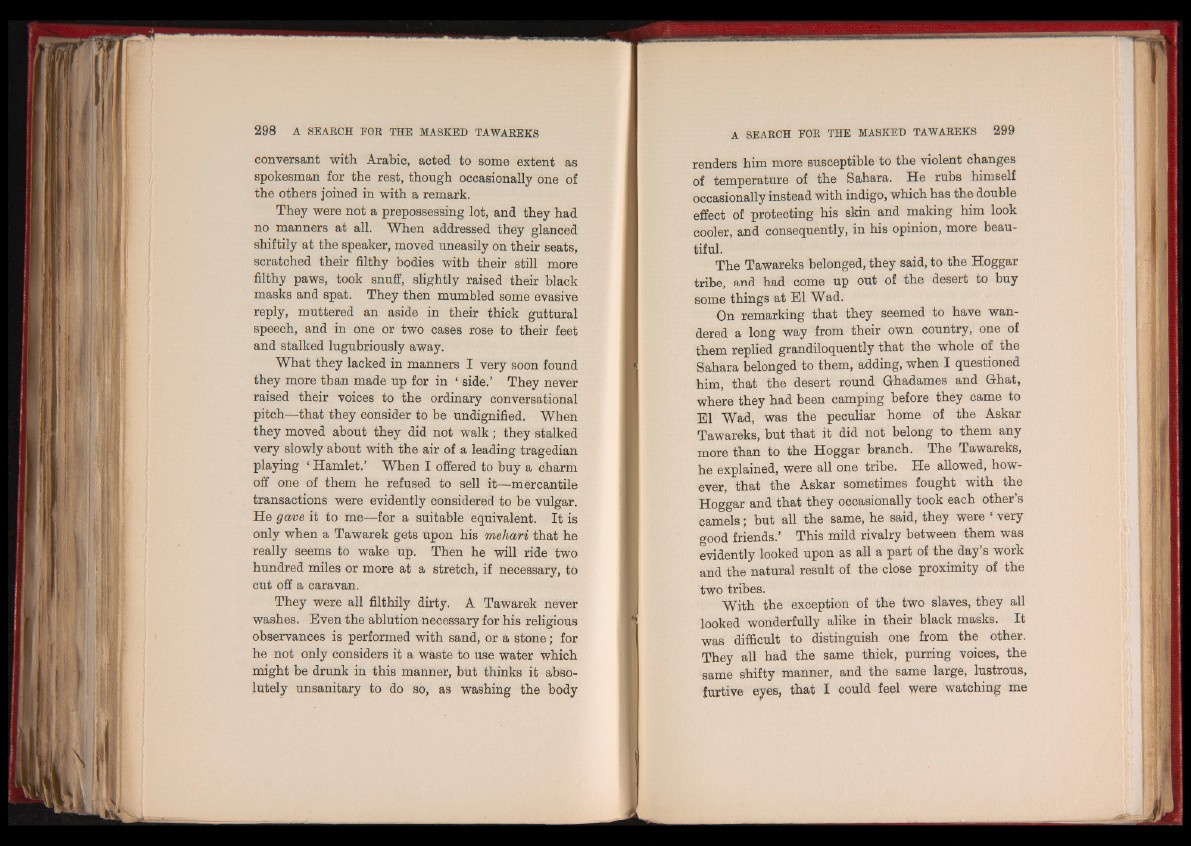
conversant with Arabic, acted to some extent as
spokesman for the rest, though occasionally one of
the others joined in with a remark.
They were not a prepossessing lot, and they had
no manners at all. When addressed they glanced
shiftily at the speaker, moved uneasily on their seats,
scratched their filthy bodies with their still more
filthy paws, took snuff, slightly raised their black
masks and spat. They then mumbled some evasive
reply, muttered an aside in their thick guttural
speech, and in one or two cases rose to their feet
and stalked lugubriously away.
What they lacked in manners I very soon found
they more than made up for in * side.’ They never
raised their voices to the ordinary conversational
pitch—that they consider to be undignified. When
they moved about they did not walk; they stalked
very slowly about with the air of a leading tragedian
playing ‘ Hamlet.’ When I offered to buy a charm
off one of them he refused to sell it—mercantile
transactions were evidently considered to be vulgar.
He gave it to me—for a suitable equivalent. It is
only when a Tawarek gets upon his mehari that he
really seems to wake up. Then he will ride two
hundred miles or more at a stretch, if necessary, to
cut off a caravan.
They were all filthily dirty. A Tawarek never
washes. Even the ablution necessary for his religious
observances is performed with sand, or a stone; for
he not only considers it a waste to use water which
might be drunk in this manner, but thinks it absolutely
unsanitary to do so, as washing the body
renders him more susceptible to the violent changes
of temperature of the Sahara. He rubs himself
occasionally instead with indigo, which has the double
effect of protecting his skin and making him look
cooler, and consequently, in his opinion, more beautiful.
The Tawareks belonged, they said, to the Hoggar
tribe, and had come up out of the desert to buy
some things at El Wad.
On remarking that they seemed to have wandered
a long way from their own country, one of
them replied grandiloquently that the whole of the
Sahara belonged to them, adding, when I questioned
him, that the desert round Ghadames and Ghat,
where they had been camping before they came to
El Wad, was the peculiar home of the Askar
Tawareks, but that it did not belong to them any
more than to the Hoggar branch. The Tawareks,
he explained, were all one tribe. He allowed, however,
that the Askar sometimes fought with the
Hoggar and that they occasionally took each other’s
camels; but all the same, he said, they were ‘ very
good friends.’ This mild rivalry between them was
evidently looked upon as all a part of the day s work
and the natural result of the close proximity of the
two tribes.
With the exception of the two slaves, they all
looked wonderfully alike in their black masks. It
was difficult to distinguish one from the other.
They all had the same thick, purring voices, the
same shifty manner, and the same large, lustrous,
furtive eyes, that I could feel were watching me